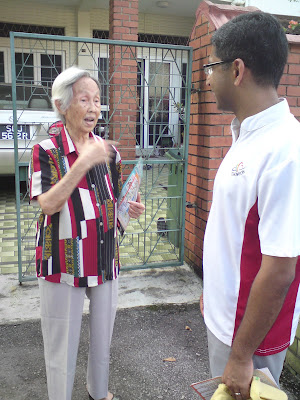More than 2000 years ago, a great Chinese philosopher said: “In calam ity lies good fortune, and in good fortune lies calamity”. It was a shrewd observation of human enterprise and fallibility.
We are now witnessing the calamity which was hiding in the economic run which started some years back; a run driven in large part by greed and ignorance. These are mistakes people have made many times in the past, and are condemned to repeat in the future.
Experts continue to debate about when this mess started, and who or what was responsible. But it does not change the fact that the world faces its most serious economic challenge in 60 years. The IMF says that world growth is at its lowest since the Second World War. Millions of jobs around the world will be lost. We have seen that Singapore is not immune.
This $20.5 bn package is a significant response. It is an extraordinary sum of money, but really, what it does, or hopes to do, is to help us tread water. No one knows how long this situation will last, how bad it will get and how much more it will cost to keep our heads above water. Many predict that the Government will have to inject even more money in the future. If anything, this Budget is a sobering testimony of how vulnerable we are and the difficult times we face.
So as time goes on, there will be increasing calls on the Government to do more for different groups, sectors or industries. We have seen examples of this around the world. In the United States, different industries have argued forcefully for a share of the bailout fund, including the pornographic industry!
But our means are not unlimited. The solution cannot be to throw money at every problem, but to pick the right battles and the right weapons to deploy.
In that regard, I would like to touch on one issue which the Budget does not address: helping Singaporeans keep their homes.
I support the Government’s focus on helping companies and businesses stay afloat by addressing their cash flow and credit issues, and thereby save jobs. Few would disagree with these objectives.
But make no mistake, we will all face a stressful time in the coming months to hold on to our jobs. No industry will be immune. It will also not matter how senior or experienced you are. I am often told by my clients that this is a good time to be a lawyer, as failing businesses often translates to more legal work. That may have been true in previous recessions. This one is turning out to be a very different creature. Over the last few weeks, law firms in the US and the UK, including major, international law firms, have been announcing thousands, of redundancies. Significantly, those receiving their pink slips include partners and senior lawyers.
So the reality is that despite the measures being taken in Singapore and the billions of dollars other governments are injecting into their own systems, the world economy will be in decline for some time, and a good number of Singaporeans will lose jobs. As the market for goods and services dry up, some companies may have no choice but to let their people go. Others will lose their jobs because their companies and businesses will go under.
More will need help. The government has increased financial assistance payments to PA recipients, CCCs’ Comcare fund, GST Credits and such. Every bit helps and is welcome. Incentivising companies to retrain and retool are also important. But with limited opportunities, it may take time for those who lose their jobs to find employment. Stress levels will go up. Now more than ever, we need to ease the pressure off Singaporeans.
I therefore hope the Government will have plans to deal with other likely points of stress. One of these will be the ability of Singaporeans to keep their homes.
To a large extent, we are fortunate that most Singaporeans live in HDB flats. I know from my MPS experience that HDB exercises considerable flexibility to help families that are unable to meet their loan payments. But over the last few years, because of regulations, many have had to finance their purchases through commercial banks. We also cannot ignore the large numbers who live in private properties. They may not have the option of downgrading because their loans exceed the value of their homes or they may not be able to get loans to purchase an alternative home. If they are retrenched and unable to service their mortgage, foreclosure is a serious risk. And a spate of foreclosures and forced sales will only depress the property market, and put more loans, and therefore homes, at risk.
There are a number of ways the government can help. For example, easing the current restrictions on obtaining HDB loans; allow those with commercial bank loans to refinance with the HDB; impose a moratorium period on foreclosures; require banks to restructure default loans, including offering interest-only payments for a specified period of time.
Other countries have or are planning schemes – the HOPE for Homeowners program in the US; the Homeowners Mortgage Support Scheme in the UK. Those programs are calibrated to meet the challenges in those countries, but the objectives are the same.
I urge the government to come up with and announce concrete plans as soon as possible so that they can be implemented quickly if needed, and Singaporeans know what the conditions are to qualify for help. It would be a major source of stress relief to know that the government will help keep a roof over our heads until the storm passes.
I am not suggesting that the government bails out everyone who defaults on a mortgage. There should be restrictions. For example, it should only be for those with one home; the inability to pay should be on account of the current economic downturn; it should not apply to those who still have the ability to downgrade, albeit at a loss.
I also accept that we cannot ignore the “moral hazard” arguments, and that public funds should not be used to bail out bad decisions or risky behaviour.
So the Government’s role should not be just to hand out money, but to clearly articulate its principles and philosophy, and to ensure that the measures it implements is consistent with these.
One important message that must be conveyed is that this exercise is a two way process. While it is the governments’ duty to give assistance where it is needed, those who receive help must take positive steps to get themselves back on their feet.
My concern is that some, despite losing their jobs, will not see the need to get back quickly into the market, preferring to wait for work which is similar or equivalent to the one they lost. In these times, they could be in for a very long wait. I have encountered too many such cases in my MPS. It is a real problem.
There are also those who are able to work, but are not inclined to because they are able to get by on the assistance they receive. I understand from the CDCs that a large number of job seekers are classified as “not job-ready” or “near job ready”, meaning that, in some cases, they are not prepared to accept work that is offered them eg, because it involves shift work or other inconvenient circumstances. One CDC officer told me that out of every 10 job seekers it helps, only 1 is “job ready”. The overwhelming majority are not. Some live in rental flats, which means they receive large subsidies. I understand that although they reject job opportunities, they continue to enjoy subsidies.
And there is decent paying work out there. An owner of a well-known chain of restaurants I spoke with recently said he cannot find Singaporeans to be restaurant managers, despite the fact that he pays between $2,000 - $2,500/mth. This disconnect does not make sense.
We have to send a strong message that we cannot afford the luxury of bring selective, especially not in these times. We need all hands at the pump to keep our economy afloat, even if it means making compromises or personal sacrifices in the short or medium term.
I therefore urge the government to re-examine the way it gives assistance. It is important to incentivise people to find work with programs like WIS. It is equally important to disincentivise those who ask for or get assistance, but refuse to help themselves.
Conclusion
There is one significant difference between our fiscal measures and those announced by some of the major developed nations. We are in a position to call on reserves, while they intend to fund programs by borrowing and making future generations pick up the tab.
As times get tougher, there will be more pressure on the Government to spend. Many, economic experts and lay persons alike, will have different ideas on how much to spend, what to spend it on and where to get the money from. The Government may have to take tough, unpopular measures. But being tough alone does not mean you are right. That takes intelligence, experience and mature judgment. Our reserves are there because of the hard work of earlier generations of Singaporeans, coupled with sound and prudent management and leadership.
Now, more than ever, we need the Government to exhibit those qualities. The problems we and other countries face are exceedingly volatile and complex. They will not be solved by spending some money here or there. We are in this for the long haul. The measures we implement have to be sound and steady. They also have to be flexible to meet new and unexpected challenges.
The Budget is evidence of that measured, mature approach. Hopefully, it will put us on the path to find good fortune in these times of calamity. I support it.





